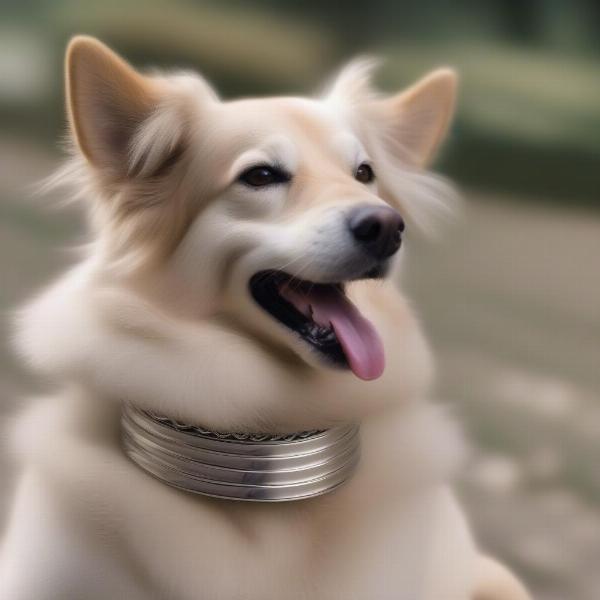Brass is a common material found in dog collars, tags, and other accessories. While it offers a stylish and affordable option, many dog owners wonder, is brass bad for dog fur? The answer isn’t a simple yes or no. While brass itself isn’t inherently toxic to dogs, certain factors can lead to unwanted reactions, particularly affecting their fur. Understanding these factors will help you make informed decisions about using brass accessories for your furry friend.
Understanding the Potential Issues with Brass on Dog Fur
One of the most common concerns with brass on dog fur is staining. This greenish-brown discoloration, often noticeable on light-colored dogs, occurs due to a chemical reaction between the copper in the brass and the moisture present in a dog’s fur, especially from saliva or rain. This reaction creates copper oxide, which then stains the fur. While not harmful, the staining can be unsightly and difficult to remove.
Another potential issue, though less common, is an allergic reaction. Some dogs are sensitive to the metals in brass, particularly copper or zinc. This sensitivity can manifest as skin irritation, redness, itching, or even hair loss in the area where the brass accessory comes into contact with the skin.
How to Minimize the Risks of Using Brass on Dog Fur
If you choose to use brass accessories for your dog, several precautions can help minimize the risk of staining and allergic reactions. Keeping your dog’s fur dry is crucial, as moisture accelerates the staining process. Wipe down brass collars and tags after they get wet, and consider removing them during bath time or swimming.
Regularly cleaning brass accessories can also prevent staining. Use a gentle metal polish specifically designed for brass and avoid harsh chemicals that could further irritate your dog’s skin. For dogs with sensitive skin, consider opting for hypoallergenic materials like stainless steel or nickel-free metals.
Choosing the Right Metal for Your Dog’s Accessories
While brass can be a stylish and affordable choice, it’s essential to weigh the potential risks against the benefits. If your dog has light-colored fur or sensitive skin, exploring alternative materials might be a better option. Stainless steel is a popular alternative known for its durability and resistance to staining and corrosion. Nickel-free metals are another excellent choice for dogs with metal sensitivities.
 Dog Wearing Stainless Steel Collar
Dog Wearing Stainless Steel Collar
Alternatives to Brass Dog Accessories
Beyond stainless steel and nickel-free metals, several other materials offer stylish and safe options for dog accessories. Leather collars, for example, are a classic choice that can be personalized and come in various colors and styles. Biothane collars are another excellent alternative, offering durability, waterproof properties, and easy cleaning. Consider exploring these options to find the perfect fit for your dog’s needs and your aesthetic preferences.
Conclusion
So, is brass bad for dog fur? While not inherently dangerous, brass can stain fur and potentially cause allergic reactions in sensitive dogs. By taking preventative measures like keeping fur dry and cleaning accessories regularly, you can minimize these risks. However, exploring alternative materials like stainless steel or leather may be a better long-term solution, especially for dogs with light-colored fur or skin sensitivities. Choosing the right accessories ensures your dog remains comfortable, stylish, and healthy.
FAQ
- How can I remove brass stains from my dog’s fur? Try using a specialized pet stain remover or a paste made of baking soda and water. Always test any cleaning solution on a small, inconspicuous area of fur first.
- What are the signs of a brass allergy in dogs? Look for redness, itching, hair loss, or skin irritation around the area where the brass accessory touches the skin.
- Are brass dog tags safe? Generally yes, but monitor for staining and allergic reactions. Consider using stainless steel tags for sensitive dogs.
- Is brass toxic if ingested by a dog? While large amounts of copper can be toxic, small amounts from a collar or tag are unlikely to cause serious harm. However, if your dog is chewing excessively on their brass accessories, consult your veterinarian.
- What’s the best alternative to brass for dog collars? Stainless steel and leather are popular and safe alternatives.
Related Articles on ILM Dog
About ILM Dog
ILM Dog (https://ilmdog.com) is your trusted international resource for expert dog care advice. We offer practical guidance on dog breeds, health, training, nutrition, grooming, and much more. Whether you’re a first-time owner or a seasoned dog lover, our goal is to provide valuable information to help you care for your canine companion. Contact us for personalized advice and recommendations at [email protected] or call us at +44 20-3965-8624.